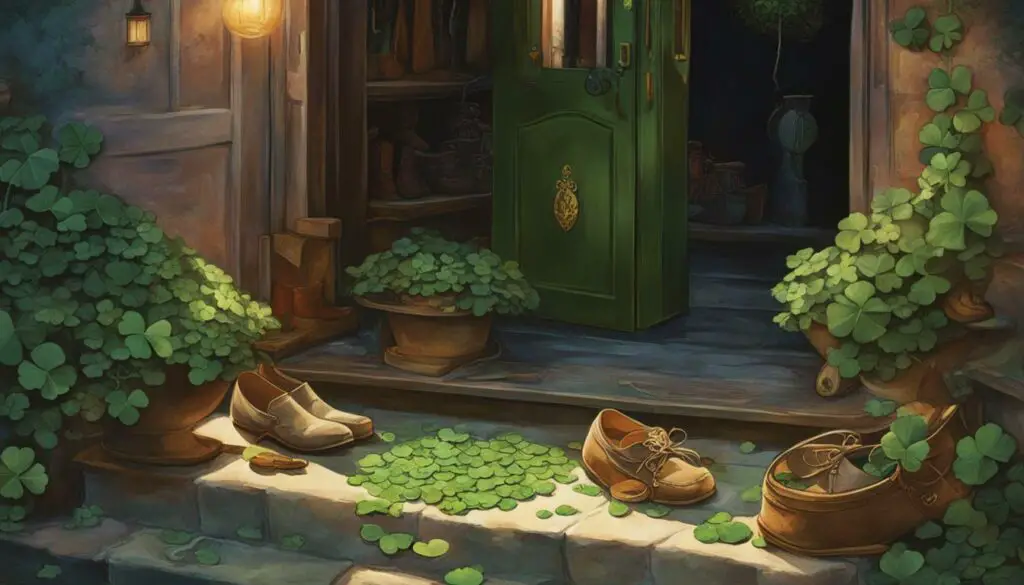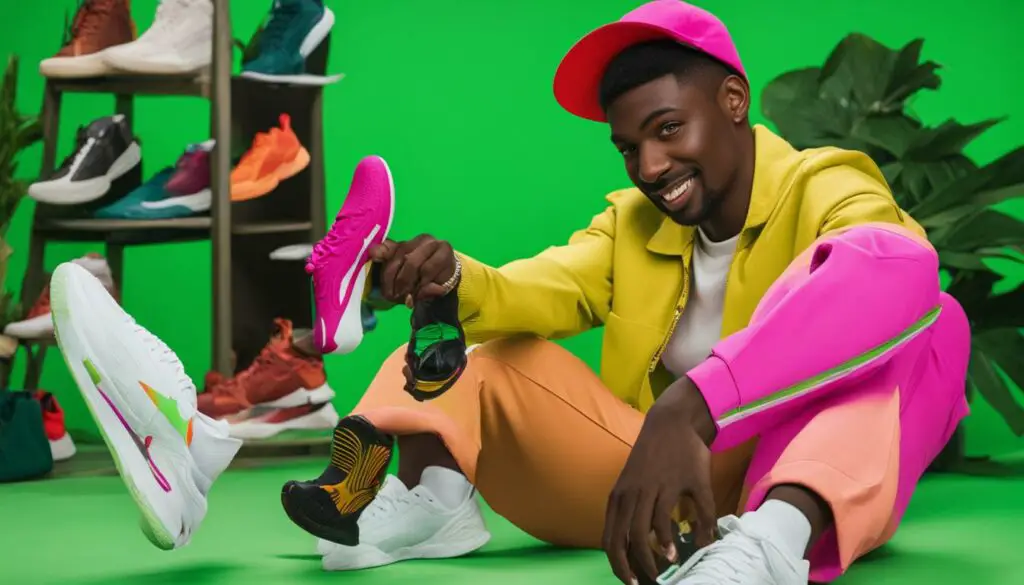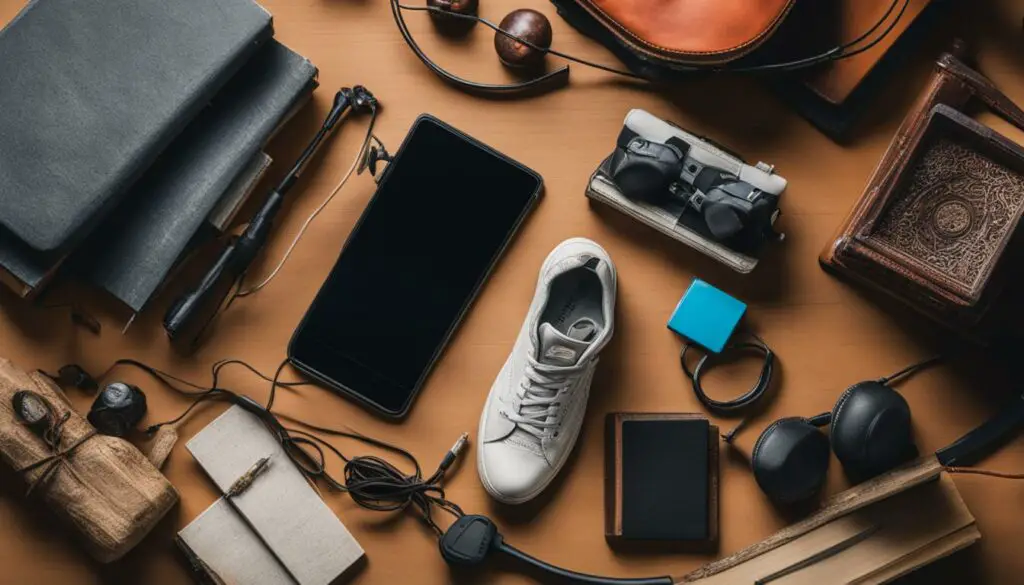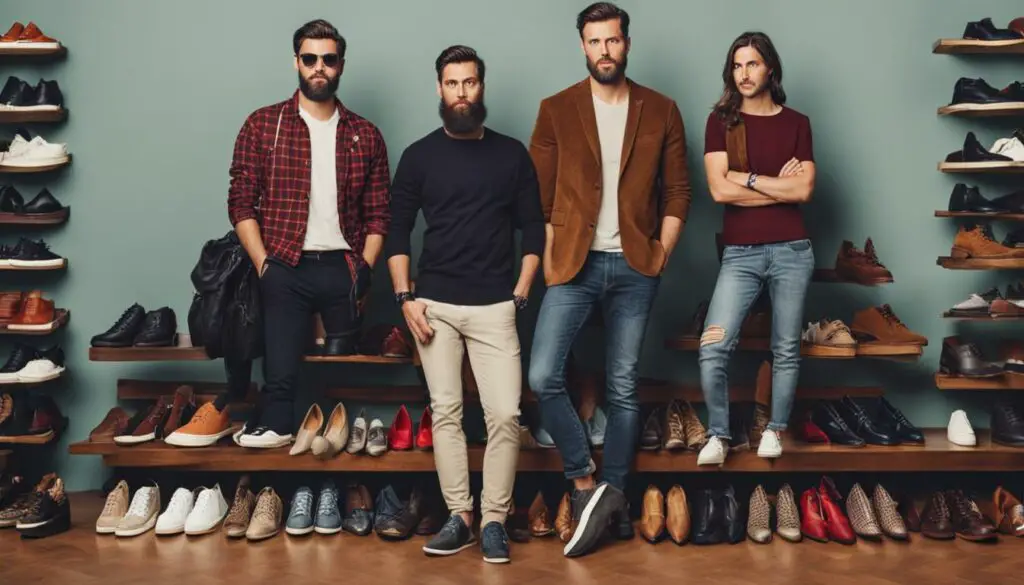Originally posted on January 24, 2024 @ 8:11 am
Have you ever heard the superstition that buying your boyfriend shoes can bring bad luck to your relationship? There’s a popular belief, known as the “shoe theory,” which suggests that gifting shoes to your partner can have negative consequences. This theory has gained traction on social media platforms like TikTok, with users sharing their cautionary tales and experiences. Let’s explore the diverse beliefs surrounding buying shoes for a boyfriend and whether there’s any truth to this myth.
Key Takeaways:
- Superstitions about buying shoes for a boyfriend have gained attention, particularly the “shoe theory.”
- The “shoe theory” is rooted in Chinese culture and suggests that gifting shoes can bring bad luck to a relationship.
- Opinions on the shoe theory vary, with some dismissing it as a cultural superstition and others believing there may be some truth to it.
- Viral TikToks have contributed to the spread of the shoe theory and sparked discussions and debates.
- Personal experiences and perspectives shape beliefs about the shoe theory, with some attributing breakups to the gift of shoes and others dismissing it as coincidence.
The Origins of the Shoe Theory

The belief in the shoe theory, which suggests that buying shoes for your boyfriend can bring bad luck to your relationship, can be traced back to a combination of ancient African religious practices and Chinese folklore.
In Chinese culture, the pronunciation of the word “shoes” sounds similar to the word for “evil” or “bad luck.” This linguistic connection has led to the belief that giving someone shoes as a gift can bring negative consequences to the relationship. This belief is not limited to romantic relationships but can also encompass platonic friendships. The notion of shoes symbolizing bad luck has been passed down through generations, becoming ingrained in cultural traditions and popular superstitions.
African religious practices have also contributed to the development of the shoe theory. In various African cultures, shoes hold symbolic significance. They are seen as items that connect individuals to the ground, their ancestors, and the spiritual realm. Wearing or receiving shoes can therefore hold spiritual implications, which may have influenced the belief in the potential negative effects of giving shoes as gifts.
These cultural influences have carried the shoe theory forward into modern times, where it has gained additional traction through social media platforms like TikTok. The spread of this superstition on TikTok has sparked discussions and debates about its validity, with individuals sharing their personal experiences and cautionary tales.
While the origins of the shoe theory can be traced back to Chinese culture and African religious practices, its interpretation and significance may vary among individuals and cultures. The cultural context and personal beliefs of each person shape their perspectives and understanding of this superstition. So, how has TikTok contributed to the spread of the shoe theory? Let’s explore this phenomenon in the next section.
TikTok and the Spread of the Shoe Theory

The shoe theory has gained immense popularity on TikTok, with users sharing their personal experiences and stories about relationships that have ended after receiving shoes as gifts. These viral TikToks have sparked widespread discussions and sparked debates about the validity of the shoe theory.
TikTok’s wide reach and influential nature have played a significant role in amplifying this superstition. As users share their experiences and cautionary tales through engaging videos, this once niche belief has found a platform to reach a much larger audience. The impact of TikTok on superstitions is undeniable, and the shoe theory is just one example of how this platform has the power to shape popular beliefs and trends.
A quick search on TikTok using hashtags such as #shoetheory or #badluckshoes will surface countless videos from users sharing their own encounters with the shoe theory. These captivating and relatable stories have resonated with viewers, leading to increased awareness and caution among those contemplating buying shoes for their partners.
With its ability to showcase real people’s experiences and perspectives, TikTok has become a powerful tool in spreading and popularizing superstitions like the shoe theory. It has given individuals a platform to voice their beliefs, share their stories, and connect with others who have had similar experiences. This collective sharing and engagement have contributed to the viral nature of the shoe theory on TikTok.
In the next section, we will delve into personal experiences and perspectives surrounding the shoe theory, shedding light on the diverse range of beliefs and opinions associated with this superstition.
Personal Experiences and Perspectives

One of the fascinating aspects of the shoe theory is how it resonates with individuals on a personal level. TikTok has become a platform for people to share their own stories and experiences with shoe-gifting, shedding light on the different beliefs surrounding this superstition.
For many TikTokers, giving their partners shoes as gifts has led to unexpected outcomes, including the end of their relationships. These personal stories serve as cautionary tales for those who believe in the shoe theory. From tearful recollections to heartfelt confessions, these TikTokers attribute the demise of their relationships solely to the shoes they gifted.
“I bought my boyfriend a pair of high-end sneakers, and things took a turn for the worse. He became distant, and our relationship eventually crumbled,” recounts Emma, a TikToker who firmly believes in the shoe theory.
However, it’s worth noting that not everyone who has experienced a breakup after giving shoes as gifts attributes the outcome solely to the shoes. Some individuals acknowledge that there may have been other factors at play, such as communication issues or incompatible values.
The shoe theory has sparked a wide range of opinions among TikTokers. While some believe it to be a valid superstition, others see it as nothing more than a coincidence. These varying beliefs demonstrate that there is no definitive answer to whether the shoe theory is true or not.
TikToker Experiences on Shoe-Gifting
From emotional testimonials to anecdotal evidence, TikTok has provided a platform for individuals to share their experiences with shoe-gifting and the subsequent outcomes. Let’s take a look at some noteworthy stories:
- @SoleSeeker: In a tearful video, TikToker @SoleSeeker recounts how her relationship fell apart after she gave her partner a pair of limited-edition sneakers. She firmly believes that the shoes brought bad luck and regrets ever buying them.
- @KicksAndLove: In a series of TikToks, @KicksAndLove shares her experience of giving her boyfriend shoes for their anniversary. She initially believed in the shoe theory but later realized that trust and compatibility were the true reasons behind the breakup.
- @ShoeObsessed: @ShoeObsessed shares an uplifting story, explaining how she and her partner embraced the shoe theory and actively created a positive narrative around the shoes they gifted each other. According to her, their relationship strengthened as a result.
These personal stories highlight the diverse perspectives surrounding the shoe theory. While some individuals adamantly believe in its power, others approach it with skepticism. The shoe theory ultimately becomes a matter of personal interpretation and belief.
Anecdotal Evidence and Skepticism

While some individuals believe in the shoe theory based on anecdotal evidence, there are skeptics who question its validity. The shoe theory suggests that buying shoes for your boyfriend could bring bad luck to your relationship. However, skeptics argue that relationships are complex and cannot be determined by a single gift.
Relationships require open communication, trust, and compatibility, not superstitions about shoes. It’s important to focus on nurturing a strong connection and understanding between partners.
Some skeptics have shared their own experiences of giving shoes as gifts without any negative consequences in their relationships. They believe that the shoe theory is nothing more than a superstition, and its validity is questionable.
It’s important to approach superstitions with a critical mindset and consider the various factors that contribute to relationship dynamics. While anecdotal stories may confirm the shoe theory for some, skeptics emphasize that there are other significant factors at play besides the act of gifting shoes.
Considering the Complexity of Relationships
Relationships are shaped by a multitude of elements, including communication, trust, compatibility, and shared values. Skeptics argue that the outcome of a relationship cannot be solely attributed to the act of giving shoes as a gift.
Instead of relying on superstitions, skeptics stress the importance of maintaining open lines of communication and fostering trust in a relationship. These fundamental aspects contribute to the strength and longevity of a partnership.
Relationships are built on mutual understanding, respect, and shared goals. The decision to give shoes or any other gift should be made with consideration for your partner’s preferences and the dynamics of your relationship.
Questioning the validity of the shoe theory allows us to critically evaluate the role of superstitions in our lives. While there may be anecdotal evidence supporting the shoe theory, skeptics remind us to prioritize communication, trust, and compatibility as the foundations of a successful relationship.
Cultural Significance and Interpretations

The shoe theory holds significant cultural meaning, particularly in Chinese culture, where the belief in the connection between shoes and bad luck is deeply rooted. In Chinese folklore, the word for shoes sounds similar to the word for “bad luck” or “evil,” creating the association between shoes and negative consequences in relationships. This belief has been passed down through generations and has become ingrained in the cultural fabric.
However, interpretations of the shoe theory can vary among individuals and cultures. While some view the act of gifting shoes as a symbolic invitation for the recipient to walk out of the relationship, others see it as a way of giving the recipient the freedom to decide their own fate. The cultural context and personal beliefs of individuals play a significant role in shaping their interpretations of the shoe theory.
Interpretations and Meanings
When it comes to the shoe theory, there are different interpretations and meanings associated with gifting shoes to a partner. Let’s explore some of the common perspectives:
- Symbolic Invitation: In this interpretation, giving shoes to a partner is seen as a symbolic invitation for them to “walk away” from the relationship. It represents an acknowledgment that the relationship may not be working or that the giver is preparing for an inevitable breakup.
- Personal Decision: Some individuals believe that gifting shoes allows the recipient to make their own decision about the relationship. It gives them the freedom to choose whether they want to stay or leave, based on their own feelings and desires.
- Compatibility Check: Another interpretation is that giving shoes is a way of testing the compatibility of the relationship. If the recipient feels uncomfortable or dislikes the gift, it may suggest a fundamental mismatch in values and preferences.
These interpretations demonstrate how the shoe theory can be viewed in different ways, depending on cultural influences, personal experiences, and beliefs.
The Shoe Theory in Other Cultures
While the shoe theory is most commonly associated with Chinese culture, similar beliefs and superstitions exist in other cultures as well. In some African cultures, it is believed that giving shoes to a partner can bring bad luck and negatively impact the relationship. These beliefs reflect the universal human tendency to assign symbolic meanings to objects and actions within the context of relationships.
Reflecting on Personal Beliefs
Understanding the cultural significance and various interpretations of the shoe theory allows individuals to reflect on their own beliefs and attitudes towards this superstition. Whether they choose to follow the shoe theory or dismiss it as superstition, the decision should be based on personal judgment and an understanding of the cultural and emotional significance attached to shoe-gifting.
Next, we’ll explore the experiences and insights of influencers in the shoe industry and how their perspectives shed light on the shoe theory phenomenon.
Influencer Perspectives

Influencers in the shoe industry have shared their valuable insights and perspectives on the shoe theory. Their experiences and opinions shed light on the beliefs surrounding shoe-gifting and the influence of superstitions on relationships.
Justin FitzPatrick: Defying Superstitions
Justin FitzPatrick, a prominent shoe influencer, firmly believes in making his own choices when it comes to gifting shoes. He emphasizes that he doesn’t let superstitions dictate his life and continues to buy shoes for his loved ones without any concern for the shoe theory. According to FitzPatrick, the shoe theory is nothing more than a cultural superstition and should not hinder the act of gift-giving.
“I don’t let superstitions dictate my life. If I want to buy shoes for my loved ones, I will do so without hesitation. Superstitions are just that – beliefs that have no scientific basis. The shoe theory shouldn’t discourage anyone from expressing their love through gifts.”
Considering Relationship Dynamics
While FitzPatrick continues to buy shoes for his loved ones, he also acknowledges that there may be other factors contributing to the end of relationships. He believes that relationship dynamics have evolved in modern times, and attributing the demise of a relationship solely to a pair of shoes is oversimplifying complex realities.
“Relationships are multifaceted. Ending a relationship over a pair of shoes seems unlikely. There are deeper issues at play, and the shoe theory is just one small piece of a much larger puzzle. It’s essential to consider the overall dynamics of a relationship before attributing negative outcomes to a single gift.”
Insights from influencers like Justin FitzPatrick provide a fresh perspective on the shoe theory, illustrating that beliefs and decisions should be based on personal judgment and understanding of relationship dynamics. Their views encourage individuals to consider their own values and experiences when navigating superstitions related to gift-giving.
Reflection and Decision-making
When it comes to buying gifts for your boyfriend, it’s crucial to take a moment to reflect on your personal beliefs regarding the shoe theory. Consider whether you attribute any significance to it based on your cultural background, personal experiences, and the opinions of others. By reflecting on these factors, you can make informed decisions about shoe-gifting that align with your own judgment and the dynamics of your relationship.
While the shoe theory may hold cultural and anecdotal significance, it’s essential to weigh it against your own values and the uniqueness of your relationship. Every relationship is different, and the shoe theory may or may not resonate with you and your partner. Remember that superstitions can vary, and what works for one couple may not apply to another.
By taking the time to reflect and consider various perspectives, you can make a decision that feels right for you and your boyfriend. Assess the significance you personally attach to the shoe theory and the level of importance you believe it holds in your relationship. Ultimately, the decision to buy shoes for your boyfriend should be rooted in your own judgment and understanding of the dynamics you share.
Remember that communication and understanding in your relationship are key. If you have any concerns or doubts about gifting shoes, discuss them openly with your boyfriend. It’s important to have an open and honest conversation about your beliefs and values to ensure clarity and mutual understanding.
Now that you’ve reflected on the shoe theory and made informed decisions about shoe-gifting, you can approach your gift selection with confidence. Whether you ultimately decide to buy shoes or explore other gift options, your thoughtful consideration and understanding of the shoe theory will guide you in choosing a meaningful and appropriate gift for your boyfriend.
Open-mindedness and Personal Choice
When it comes to the shoe theory, it’s important to approach it with open-mindedness and respect for diverse beliefs. While some individuals firmly believe in the superstition, others may dismiss it as a cultural myth. Regardless of your stance, it’s crucial to recognize that people’s beliefs and experiences may differ from your own.
Respecting diverse viewpoints means allowing for personal choice in gift-giving. Whether you choose to give your boyfriend shoes or not should ultimately depend on your partner’s preferences, values, and the dynamics of your relationship. Communication and understanding between partners play a vital role in navigating these superstitions and making mutually respectful decisions.
“Respecting diverse beliefs means understanding that not everyone sees the shoe theory the same way. It’s important to communicate openly with your partner and consider their thoughts and feelings before making any decisions.”
Remember, the shoe theory is just one aspect of the larger realm of superstitions. By staying open-minded and considering various perspectives, you can create a space where individual choices are respected, and relationships can flourish.
Below is a table summarizing different viewpoints on the shoe theory:
| Perspective | Belief about the Shoe Theory |
|---|---|
| Believers | View gifting shoes as bad luck and may avoid it |
| Skeptics | Don’t attribute any negative consequences to gifting shoes |
| Open-minded | Recognize the shoe theory but consider other factors in relationships |
Conclusion
The belief in the shoe theory and the superstition surrounding shoe-gifting for boyfriends is subjective and varies among individuals. While some swear by its validity based on personal experiences, others dismiss it as mere coincidence. It’s crucial to approach these superstitions with a critical and open mind, making informed choices based on your own beliefs, values, and the unique dynamics of your relationship.
In the end, the decision to buy shoes for your boyfriend should be based on thoughtful consideration and an understanding of the cultural and personal significance attached to this act. Whether you choose to embrace the superstition or not, it’s essential to prioritize effective communication, trust, and compatibility in your relationship. Remember that making informed choices in relationships goes beyond mere superstitions and involves considering your partner’s preferences and the overall dynamics of your connection.
Ultimately, the shoe theory should not completely dictate your actions, but rather serve as a catalyst for reflection and conversation. By engaging in open-minded discussions with your partner about beliefs, values, and superstitions, you can navigate the world of shoe-gifting and relationships with respect and understanding. As you continue on your journey, may you find fulfillment in both the thoughtful gifts you give and the love and understanding you share.
FAQ
Is it bad luck to buy your boyfriend shoes?
The belief that buying your boyfriend shoes can bring bad luck to your relationship is based on a popular superstition called the “shoe theory.” While opinions on this theory vary, some attribute negative consequences to giving shoes as gifts.
What is the origin of the shoe theory?
The shoe theory is believed to have origins in a combination of ancient African religious practices and Chinese folklore. In Chinese culture, the pronunciation of the word “shoes” is similar to the word for “bad luck” or “evil,” leading to the belief that giving someone shoes can bring negative consequences.
How has TikTok influenced the spread of the shoe theory?
TikTok has played a significant role in amplifying the superstition surrounding shoe-gifting. Users have shared their personal experiences and cautionary tales about relationships ending after receiving shoes as gifts, sparking discussions and debates about the validity of the shoe theory.
What are some personal experiences and perspectives on the shoe theory?
Many individuals have shared their personal experiences with the shoe theory, recounting instances where their relationships ended shortly after giving their partners shoes as gifts. Opinions on the shoe theory vary, with some viewing it as a valid superstition and others dismissing it as coincidence.
Are there skeptics who question the validity of the shoe theory?
Yes, there are skeptics who question the validity of the shoe theory. Some individuals have given shoes as gifts without experiencing any negative consequences in their relationships, leading them to dismiss the shoe theory as mere superstition.
What are the cultural significance and interpretations of the shoe theory?
In Chinese culture, the belief in the connection between shoes and bad luck is deeply rooted. Interpretations of the shoe theory can vary among individuals and cultures, with some viewing it as a symbolic invitation to leave the relationship and others seeing it as an opportunity for the recipient to decide for themselves.
What do influencers in the shoe industry say about the shoe theory?
Influencers in the shoe industry have shared their perspectives on the shoe theory. Some emphasize that they do not let superstitions dictate their lives and continue to buy shoes for their loved ones without concern for the shoe theory. Others acknowledge the larger trend of relationship dynamics shifting in modern times.
How can I make an informed decision about buying shoes for my boyfriend?
When deciding whether to buy shoes for your boyfriend, it’s important to reflect on your own beliefs about the shoe theory and consider the dynamics of your relationship. Communication and understanding between partners play a vital role in navigating superstitions and making mutually respectful decisions.
Should I be open-minded and respect diverse beliefs about the shoe theory?
Yes, it’s important to approach the shoe theory with open-mindedness and respect for diverse beliefs. Recognize that the beliefs and experiences of others may differ from your own and allow for personal choice in gift-giving.
What is the conclusion about the shoe theory?
There is no definitive answer as to whether the shoe theory is true or not. While it holds cultural significance in Chinese culture, the belief in the shoe theory is subjective and varies among individuals. Making an informed choice about buying shoes for your boyfriend should be based on thoughtful consideration and an understanding of the cultural and personal significance attached to this act.
